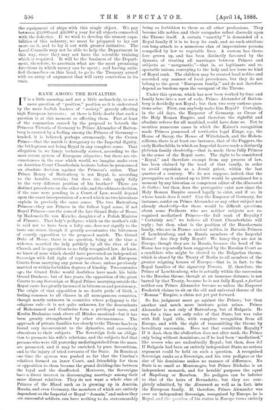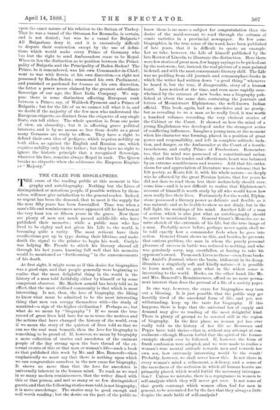RANK AMONG THE ROYALTIES.
IT is a little amusing, and not a little melancholy, to see a mere question of " position," position as it is understood by the more foolish leaders of " society," gravely affecting high European interests ; ut there is little doubt that such a question is at this moment so affecting them. Part at least of the commotion caused by the proposal to betroth the Princess Victoria of Germany to Prince Alexander of Batten- berg is created by a feeling among the Princes of Germany— headed, it is believed, perhaps erroneously, by the Crown Prince—that the match is derogatory to the Imperial dignity, the bridegroom not being Royal in any complete sense. That allegation is, we fancy, technically correct, according to the most recent system of European etiquette ; but there are cir- cumstances in the case which would, we imagine, make even an Austrian Court Chamberlain hesitate before he pronounced an absolute decision against the Princess's suitor. That Prince Henry of Battenberg is not Royal, is, according to the heralds, certain ; but does the rule apply fully to the very different position of his brother ? There are distinct precedents on the other side, and the ultimate decision, if the case were pending in a Court of Law, would depend upon the exact interpretation of a word which no two historians explain in precisely the same sense. The two Battenberg Princes—they are Princes in the fullest legal sense, if not Royal Princes—are the sons of the late Grand Duke of Hesse, by Mademoiselle von Kaucke, daughter of a Polish Minister of Finance. That lady's pedigree, which on the mother's side is said not to have been a lofty one, does not signify to the issue one straw, though it greatly accentuates the bitterness of courtly opposition to the proposed match. The Grand Duke of Hesse, there is no question, being at the time a widower, married the lady publicly by all the rites of the Church, and in opposition to no fully recognised law. At least, we know of none which should have prevented an independent Sovereign with full right of representation in all European Courts from marrying any person he chose, unless previously married or within forbidden degrees of kinship. Two centuries ago, the Grand Duke would doubtless have made his bride Grand Duchess ; but of late years, the opposition of the great Courts to any Sovereign or Royal Prince marrying outside the Royal caste has greatly increased in bitterness and persistency. The origin of that opposition is no doubt pride of birth, a feeling common to all classes in all monogamous countries, though nearly unknown in countries where polygamy is the religious rule—it is not quite unknown, for the descendants of Mahommed and Confucius form a privileged caste, and Koolin Brahmins rank above all Hindoo mankind—but it has been greatly strengthened by other circumstances. The approach of private families too closely to the Throne has been found very inconvenient to the dynasties, and excessively obnoxious to their subjects. The Sovereign feels an obliga- tion to promote his wife's relations, and the subjects feel that persons who were till yesterday undistinguished from the mass, are promoted, and it may be enriched, by pure favouritism, and to the injury of tried servants of the State. In Russia at one time the system was pushed so far that the Czarina's relatives formed an inner Court, and friendship for them or opposition to them became the grand dividing-line between the loyal and the disaffected. Moreover, the Sovereigns have a direct interest in discouraging marriage among their more distant relatives. They do not want a whole clan of Princes of the Blood such as is growing up in Austria, Russia, and even Germany, the members of which are entirely dependent on the Imperial or Royal " domain," and unless they are successful soldiers, can have nothing to do, statesmanship being as forbidden to them as all other professions. They become idle nobles, and their escapades reflect discredit upon the Throne itself. A certain " sanctity " is demanded of a Royal family if it is to keep its rank, and no such attribute can long attach to a numerous clan of impecunious persons compelled by law to vegetable lives. A custom has there- fore grown up, and has been distinctly favoured by the dynasts, of treating all marriages between Princes and subjects as " morganatic,"—that is, as legitimate and re- spectable unions, conveying to the lady and her issue no kind of Royal rank. The children may be created local nobles and accorded any manner of local precedence, but they do not belong to the great "European family," and do not therefore depend as burdens upon the occupant of the Throne.
Under this system, which has now been worked by time and family laws into a sort of code, Prince Alexander of Batten- berg is decidedly not Royal ; but then two very curious ques- tions arise. First, can anybody make him Royal? Certainly, in the old days, the Emperor of Germany, as Caesar of the Holy Roman Empire, and therefore the rightful and absolute referee for all mankind, could have done so. Not to mention numerous cases in which the Kaiser's recognition made Princes possessed of territories legal Kings, e.g., the House of Savoy, the House of Wittelsba,ch, and the Hohen- zollerns, there is at least one instance, that of the Fuggers, the early Rothschilds, in which an Imperial decree made a distinctly plebeian family ebenbArtig,—that is, made them fully Princes in the sense of the Royal caste. The right to be considered " Royal," and therefore exempt from any process of law, has been claimed by the head of that family, in order to avoid expulsion as a Jesuit priest, within the last quarter of a century. We do not suppose, indeed, that the prerogative as it existed up to 1806 would be questioned for a moment by any historian or competent editor of the Almanach de Gotha ; but then, does the prerogative exist now since the Holy Roman Empire ceased legally to exist, and if so, in whose hands does it rest? Can the Emperor of Germany, for instance, confer on Prince Alexander or any other subject not already ebenbiirtig—for there would be difficult questions about some Freiherrs who are neither subjects nor re- cognised mediatised Princes—the full rank of Royalty ?
Certainly not," we believe all Court Chamberlains will reply ; but then, what is the position of the Beauharnais family, who are in France ancient nobles, in Bavaria Princes of Leuchtenberg, and in Russia members of the Imperial House ? Are they fully Royal ? We fancy they are not in Europe, though they are in Russia, because the head of the House has repeatedly been suggested by the Russian Court as a candidate who might be elected to the Bulgarian throne, which is closed by the Treaty of Berlin to all members of the greater reigning houses of Europe,—that is, in fact, to the Royal families of the signatory Powers. If, therefore, the Prince of Leuchtenberg, who is actually within the succession to the Russian throne, though at an immense distance, is not barred by that Treaty, because he is not fully Royal, a fortiori neither can Prince Alexander become so unless the Emperor Frederick claims to sit on the old and universal throne of the " Roman " Empire, a claim not yet put forward.
So far, judgment must go against the Prince; but then another and much more intricate point arises. Prince Alexander is not only of Battenberg, but of Bulgaria. He was for a time not only ruler of that State, but was ruler with full legal title, with complete recognition from all Europe, and with the right of transmitting the throne by hereditary succession. Does not that constitute Royalty? If it does, then the abdication does not alter rank, the Prince only being without dominions, as if he had been "mediatised," like scores who are undoubtedly Royal ; but then, does it? If Bulgaria had been an entirely independent State, no serious argument could be held on such a question. A recognised. Sovereign ranks as a Sovereign, and his own pedigree or the size of his dominions makes no manner of difference. No State is so small as Montenegro, but Prince Nicholas is an independent monarch, and for heralds' purposes the equal of Hapsburg or Bourbon. No pedigree can be inferior to that of the heirs of Bernadotte, but they are com- pletely admitted, by the Almanach as well as in fact, into the European family. If, therefore, Prince Alexander was ever an independent Sovereign, recognised by Europe, he is Royal. and the question of his status in Europe turns entirely upon the exact nature of his relation to the Sultan of Turkey. That he was a vassal of the Ottoman for Roumelia, is certain, and is not denied ; but was he a vassal for Bulgaria ? All Bulgarians deny it, and it is excessively difficult to dispute their contention except by the use of defini- tions which would make every Prince of Germany who has lost the right to send Ambassadors cease to be Royal. Wherein lies the distinction as to position between the Princi- pality of Bulgaria and the Principality of Baden-Baden? The Prince, be it remembered, was his own Commander-in-Chief ; went to war with Servia at his own discretion,—a right not possessed by Baden-Baden; summoned his own Parliament; and punished or pardoned for treason at his own discretion, the latter a power never claimed by the greatest subordinate Sovereign of our age, the East India Company. We sup- pose there is some distinction affecting European rank between a Prince, say, of Waldeck-Pyrmont and a Prince of Bulgaria ; but for the life of us we cannot tell what it is, and we doubt if the majority of the few men who understand the European etiquette, as distinct from the etiquette of any single State, can tell either. The whole question is, from one point of view, an absurdity ; but it is affecting grave political interests, and is by no means so free from doubt as a great many Germans are ready to affirm. They have a right to defend their own idea of pedigree, which requires nobility on both sides, as against the English and Russian one, which requires nobility only in the father ; but they have no right to ignore the historic principle that a recognised Sovereign, whatever his fate, remains always Royal in rank. The Queen breaks no etiquette when she addresses the Empress Eugenie as " Majesty."



































 Previous page
Previous page